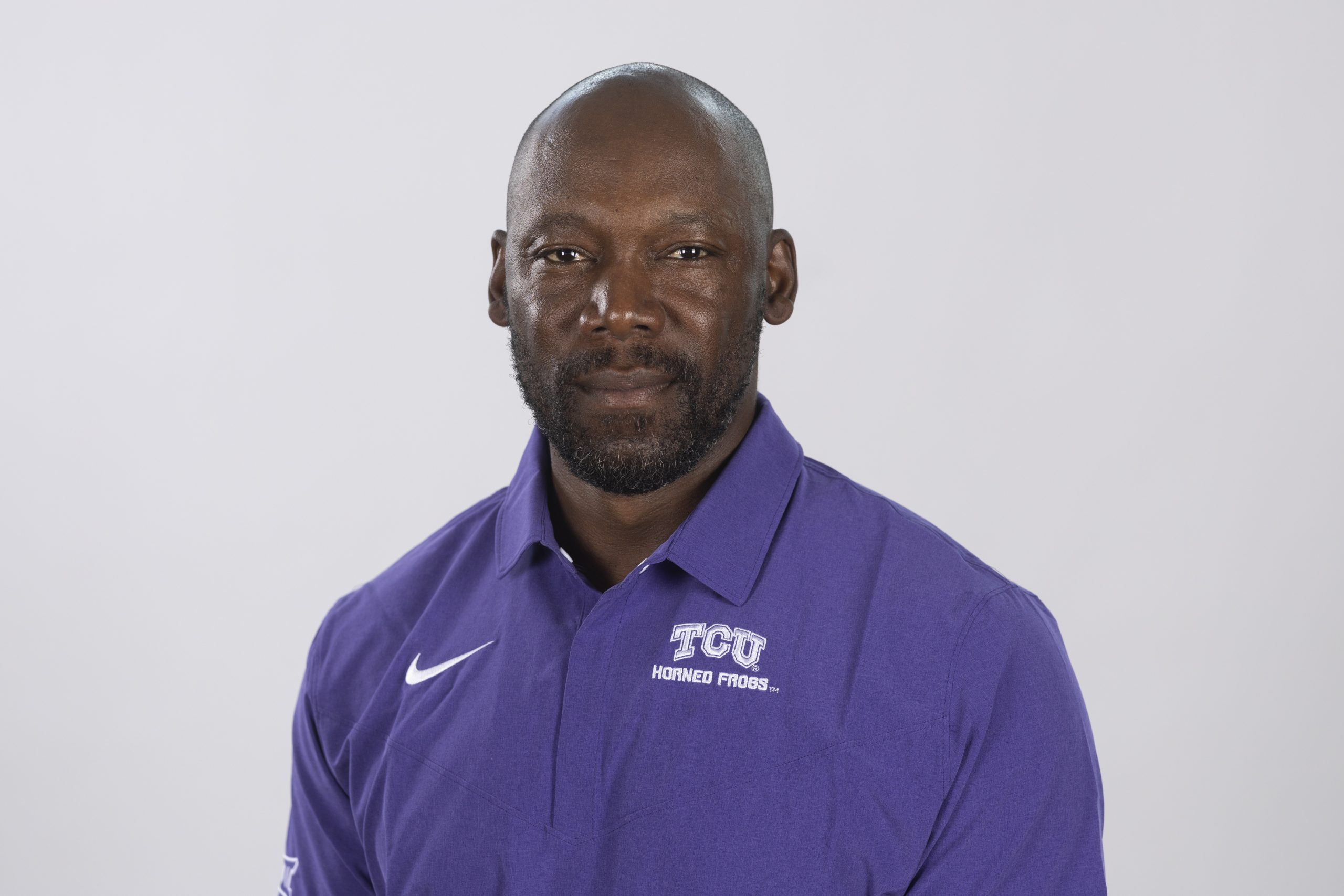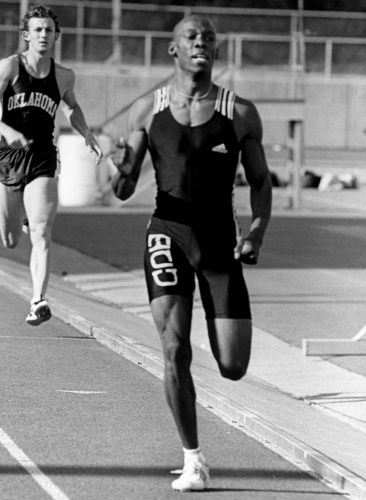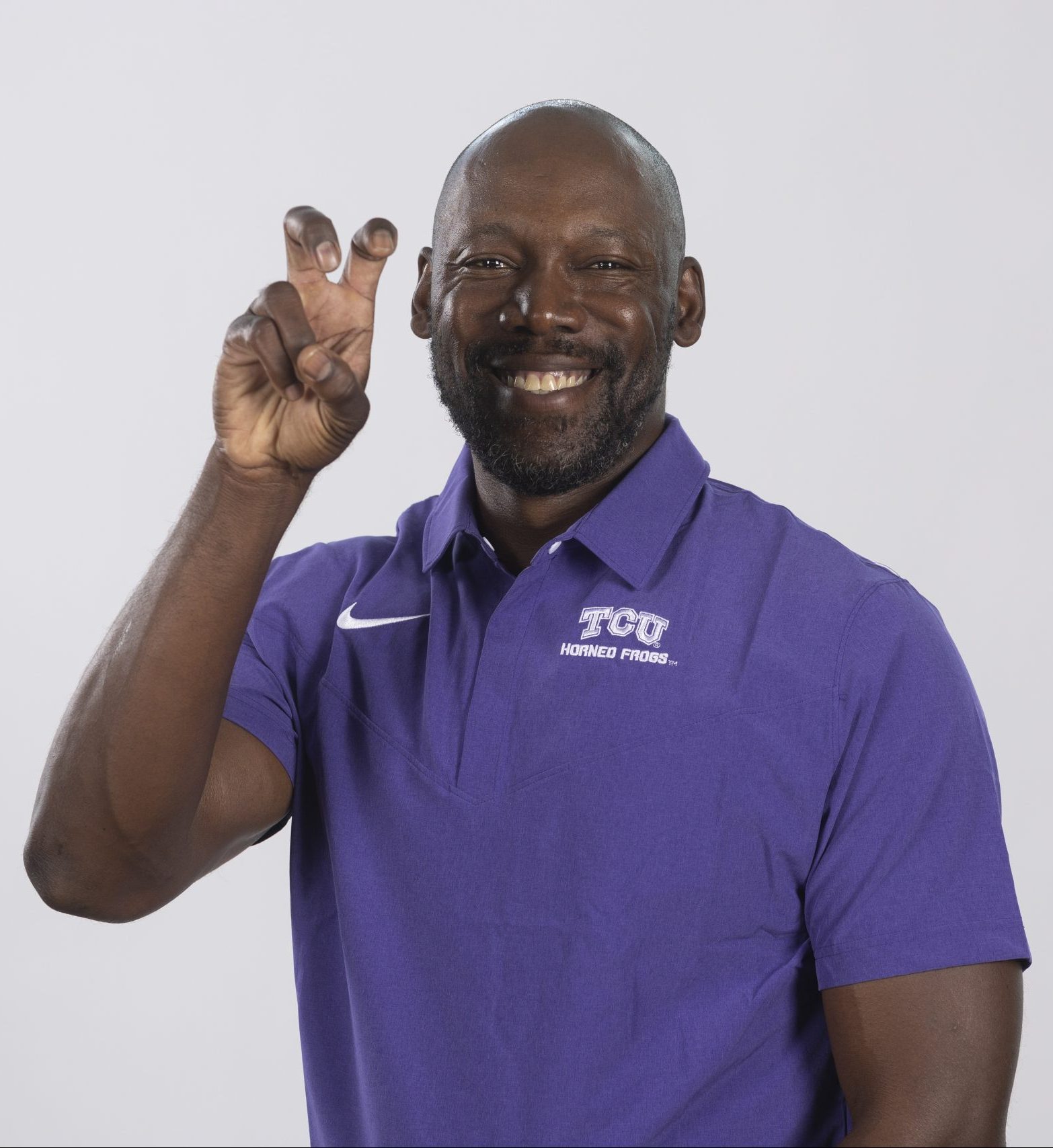Q&A: Khadevis Robinson
The new director of TCU Track & Field, inspired by his Horned Frog past, has big plans for the future.

Khadevis Robinson is back with TCU Track & Field, this time as the program's head coach. Photo by Ellman Photography
Q&A: Khadevis Robinson
The new director of TCU Track & Field, inspired by his Horned Frog past, has big plans for the future.
As an undergraduate, Khadevis Robinson won the 1998 NCAA outdoor championship in the 800-meter run and earned a degree in social work. He went on to win four indoor and four outdoor national championships in sprints and relays, set national and world records, and represent the U.S. in the 2004 and 2012 Olympics.
In high school you started out as a football player. Why did you shift to track & field?
Our football coaches in high school wanted all the skilled players to run track. Secondly, a lot of my friends were out there running, so it was a way to be around them. And thirdly, because there were girls out there running, to be quite honest. It was a win-win in all directions.
Why did you choose to come to run track at TCU?
John McKenzie ’64 (MEd ’66) recruited me, and when I met him, I got a good feeling from him. I just thought he was going to be someone that you could trust — a reliable, good coach. And I really felt like he would care about me as an individual and not just an athlete. And that proved to be true. We’re still close — we’re talking almost 30 years later.
What was your proudest moment as a TCU student-athlete?
If I wouldn’t have won a national championship and not gotten my degree, I don’t think my parents or grandparents would have been exceptionally happy or proud. So getting a degree was probably the first thing. And then secondly, winning the national championship.
What drew you to studying social work, and how did that help you in your career as an athlete, motivational speaker and coach?
I knew I wanted to work with people. I knew I wanted to do social service. And the social work program here was really good. We had Linda Moore, a professor of social work, and all these other professors who were very personable; the classes were awesome and they really cared. It guided me because I was also a leader on campus. I was vice president of the National Association of Social Workers and in the House of Student Representatives. So it really got me involved not only in the degree aspect, but also with the community at large at TCU, and then also just beyond the TCU community.
How did taking a leadership role on campus impact you?
I was vice president of Black Student Caucus. And that was good because it allowed me to really interact with individuals like myself on this campus and embrace the different environments each had to come from. I’ve always been somewhat of a leader. Martin Luther King Jr. called it the drum major instinct. We all have that little drum major instinct in us — we want to be out front and lead. So I’ve always had that, and you find out really quickly that that’s not always as fun as it might seem. But I knew I wanted to be more than just a student-athlete. I felt like I had more to offer than just running. So that helped me network with the students outside of the athletic department, and that’s how I met my wife.

Khadevis Robinson was an All-American athlete at TCU and was also vice president of Black Student Caucus. Photo by TCU Athletics
What did you love about being part of the TCU track & field team?
My senior year was our best year. I honestly believe we all loved each other. We’re still friends to this day. As a matter of fact, Johnny [Collins ’00], Roy [Williams ’04] and I were just together last week. Clayton [Brookins ’99] — I was with him this weekend. So you really develop these friendships that last a lifetime. It was just fun, which is how sports are supposed to be. And it’s tough these days because it’s so competitive; as a coach, I look back and I realize how special those years were.
How was the transition from student-athlete to professional athlete?
When you’re in college, you have a team. On the pro level, it’s a job. You have to look at it like an entrepreneur because it ain’t just running. You have to do your taxes, manage your time, set your schedule and take care of your body. But it was a great journey. I was fortunate enough to be relatively successful at it. I learned that if you really have a goal, you write it down and you stay connected to positive, productive, powerful people, good things can happen.
You represented the U.S. at the 2004 and 2012 Olympics. How did you stay focused while on the world stage? What’s your best memory from those experiences?
For some of us, if you’re not focusing, you’re not going to do well. I wasn’t good enough to not be all in and do well, so I didn’t have a choice. Every human being should go to an Olympic games if they can. It’s the only event in the world where you truly have everyone. The energy is just different, and I just think people need to experience that because when you do, like I did, you realize that they all have a story. If you can get in that space and really look up, you will learn about people achieving amazing things.
That’s really why I coach. I’ve had my 15 minutes of fame. I don’t need to stick out my chest. I coach because there’s a Khadevis Robinson out there, and no one can see him or her. I want to be the coach that can see that. That’s why I coach.
Khadevis Robinson, director of track & field
You’ve been coaching at the collegiate level since 2011. What prompted the transition from athlete to coach?
I was coaching a pro team and one of my professional athletes was coaching high school. Then she got a college job and had to leave so she asked me to fill in and I did — and I loved it. Then a friend of mine, a head coach over at University of Nevada, Las Vegas, asked me to come there and help out. Next thing, I get a call from Ohio State. And that’s just how the story goes. You just keep getting calls or opportunities, and you just try to make the best decision on each one and you keep pushing forward from there.
What is most important to you as a coach?
Relationships. When I was coming up, coaches were an extension of the family. I don’t believe our job is just to coach and get kids to run fast. We spend more time with our athletes than their parents do. And a lot of times, the student-athletes look up to us, and they look to us for advice. That’s really why I coach. I’ve had my 15 minutes of fame. I don’t need to stick out my chest. I coach because there’s a Khadevis Robinson out there, and no one can see him or her. I want to be the coach that can see that. That’s why I coach.
How did you feel when you were extended the offer to come home to TCU as director of track & field?
I was extremely excited. I’m from Fort Worth and also attended and graduated from TCU. To be able to come back and be the head coach and work with TCU, and also being back in the DFW area, was like a dream come true. It’s kind of a dream job for me. I knew that there would be some challenges. Obviously, things are a bit different now than they were when I was here. But nevertheless, I like challenges. And I just thought, “This is a great opportunity for me.”
What can we expect from TCU Track & Field in the near future?
I think our goal is to have more of a well-rounded team, where not only are we going to continue to be really good in the sprints, but we’re going to have some representation in different areas and disciplines. The biggest thing we’re trying to establish now is culture. I’ve put together a full team, and I think you’ll start to see the success that goes with it.
What are your priorities in terms of team culture at TCU?
Sports are supposed to be fun; they’re supposed to be something that we enjoy, and I want to build a culture like when I was here. When I was here, we really loved each other; we still communicate, and our children play with each other. The first thing is to have a culture in which people love TCU, where people love competing for TCU and they are a proud part of this. Secondly, you want to build a culture of competitiveness and success.
What are your long-term goals for TCU Track & Field?
To have TCU to be one of the premier teams in the nation. But we have to build it. Specifically, we want to make sure that we have representation on both the men’s and women’s side. These next two years will be interesting because we’re trying to build a well-rounded team. Also, we want to reconnect with Texas and the DFW area. Getting connected with the community and getting alumni back into it is also a big goal; it takes time to do that. Obviously, you want to win, you want to do well, you want to perform well. But also you want to make sure that you’re connected with your alumni, connected with the community and connected with the city and state.

Khadevis Robinson won the 1998 NCAA outdoor championship in the 800-meter run. Photo by Ellman Photography.

Your comments are welcome
3 Comments
I must convey my sincerest appreciation for the article published about your exceptional work as a track coach at TCU. It is truly amazing to see the phenomenal impact you have had on your team and the legacy you are creating. Your dedication, perseverance and unwavering passion have clearly made a profound impression not only on your athletes, but also on the entire sports community. Your groundbreaking achievements and constant pursuit of excellence have set a high benchmark for others to aspire towards. I am incredibly proud of your accomplishments as a coach and I am sure that there are many more to come in the future. Keep up the outstanding work and continue to inspire and motivate those around you to reach their full potential.
I’m so proud of you. Keep up the great work. Such a great article.
Khadevis has always been an humble selfless hard working kid and man the whole time I’ve known him — from humble beginnings to International and timeless achievements!
Related Reading:
Alumni, Features
CHEW to the Rescue
A desire to help dogs led Leigh Owen Sendra to launch a nonprofit veterinary clinic.
Alumni, Features
Finding a Fit
A Neeley alum matches workers on the autism spectrum to high-tech careers.